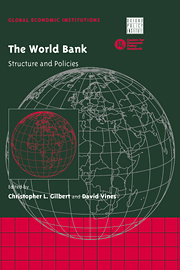Book contents
- Frontmatter
- Contents
- List of figures
- List of tables
- List of contributors
- Acknowledgements
- Introduction
- 1 The World Bank: an overview of some major issues
- Part One The World Bank's Structure: The Bank as an Institution
- Part Two The Effectiveness of World Bank Assistance
- 6 The World Bank and structural adjustment: lessons from the 1980s
- 7 The implications of foreign aid fungibility for development assistance
- 8 Aid, growth, the incentive regime and poverty reduction
- 9 How policies and institutions affect project performance: microeconomic evidence on aid, policies and investment productivity
- 10 Increasing aid effectiveness in Africa? The World Bank and sector investment programmes
- 11 The World Bank, conditionality and the Comprehensive Development Framework
- 12 Conditionality, dependence and coordination: three current debates in aid policy
- Index
10 - Increasing aid effectiveness in Africa? The World Bank and sector investment programmes
Published online by Cambridge University Press: 12 October 2009
- Frontmatter
- Contents
- List of figures
- List of tables
- List of contributors
- Acknowledgements
- Introduction
- 1 The World Bank: an overview of some major issues
- Part One The World Bank's Structure: The Bank as an Institution
- Part Two The Effectiveness of World Bank Assistance
- 6 The World Bank and structural adjustment: lessons from the 1980s
- 7 The implications of foreign aid fungibility for development assistance
- 8 Aid, growth, the incentive regime and poverty reduction
- 9 How policies and institutions affect project performance: microeconomic evidence on aid, policies and investment productivity
- 10 Increasing aid effectiveness in Africa? The World Bank and sector investment programmes
- 11 The World Bank, conditionality and the Comprehensive Development Framework
- 12 Conditionality, dependence and coordination: three current debates in aid policy
- Index
Summary
Introduction
Recent literature, much of it deriving from World Bank research, has reached strong conclusions about the conditions under which official development assistance (ODA) can make a positive contribution to poverty reduction and other development objectives. These conclusions, if correct and broadly accepted, would have a profound impact on development assistance practice, especially when combined with effective commitment by donors to the DAC target of halving absolute poverty by 2015.
This chapter examines, in the light of this literature, experience with one specific instrument, the Sector Investment Programme (SIP), that the World Bank has taken the lead in promoting as a way of increasing aid effectiveness, especially in Africa. This initiative, coordinated with other bilateral and multilateral agencies through the UN Special Programme for Africa (SPA), has been part of a broader interest in the concept of what are now generally termed Sector-Wide Approaches (SWAps). Several bilateral agencies, notably in the Nordic countries (see for instance DANIDA, 1996; SIDA, 1995), have explicitly incorporated the principles of the sector-wide approach into their development assistance policies.
Section 2 briefly reviews the findings of recent analyses of aid effectiveness, focusing on five issues: policy environment, ownership, fungibility, conditionality and institutional capacity. Section 3 discusses the SIP instrument and the broader SWAp concept and examines how SIPs were intended to improve aid effectiveness. Section 4 summarises experience with application of the SIP concept in practice, focusing on the agriculture sector in Africa.
- Type
- Chapter
- Information
- The World BankStructure and Policies, pp. 266 - 281Publisher: Cambridge University PressPrint publication year: 2000
- 1
- Cited by



